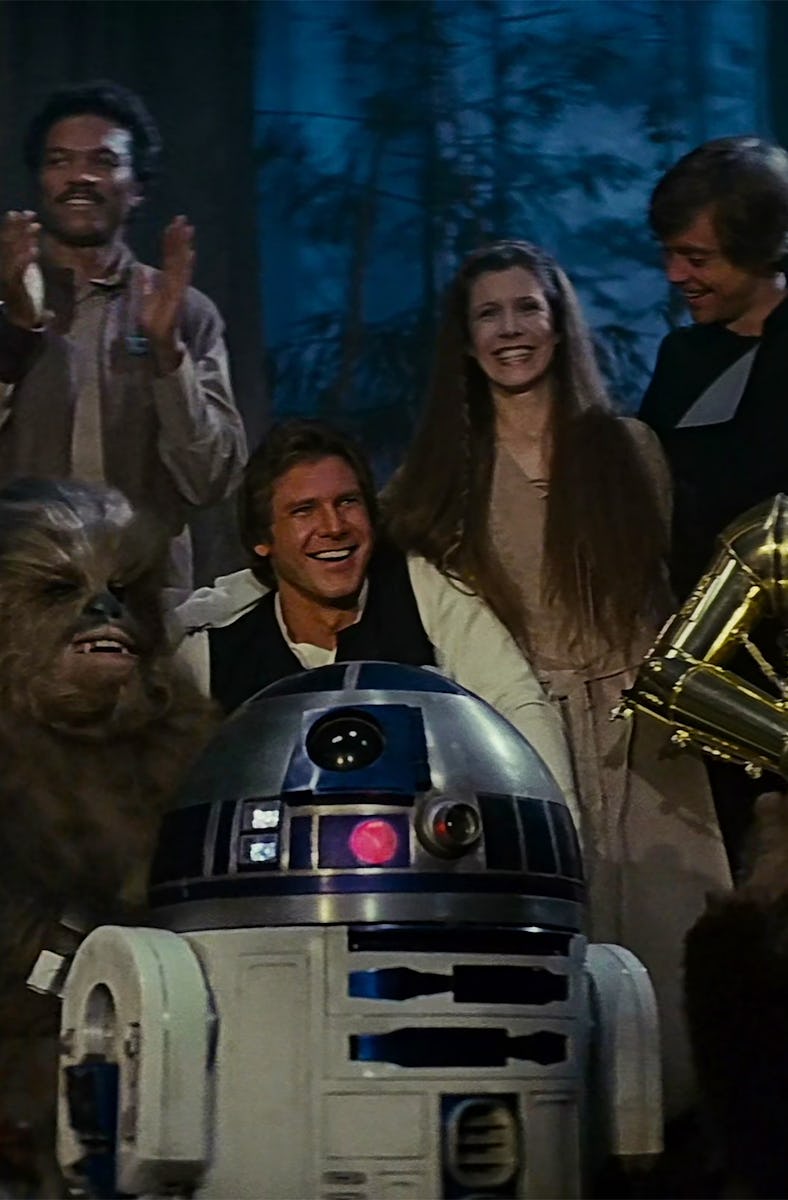The Skywalker Saga Should Have Ended 40 Years Ago
George Lucas had to bring his saga to a premature close. It should have stayed that way.

The making of the original Star Wars trilogy was a never-ending ordeal for George Lucas. In the beginning, Lucas conceived of Star Wars as a nine-film saga. When A New Hope (then known just as Star Wars) became a cultural phenomenon overnight, his dream felt closer than ever, but stress-induced medical emergencies and the perpetual threat of bankruptcy forced Lucas to choose his next moves very carefully.
After The Empire Strike Back’s cliffhanger ending, demand for more Star Wars stories skyrocketed. For years, fans clamored to know whether Han Solo would be rescued from his carbonite prison, whether Darth Vader really was Luke’s father, and whether Luke would succumb to the dark side. Who was the “other” that Yoda had spoken of in Empire? How would the Rebellion defeat the nefarious Emperor Palpatine? Would Leia choose Han, or would she end up with Luke?
The fandom could have devoured all nine of Lucas’ proposed films and still been hungry for more. Lucas, however, was done.
According to J.W. Rinzler's The Making of Star Wars: Return of the Jedi, Lucas only returned to Star Wars out of obligation. “I’m not having fun,” he said at the time. “I’m only doing this because I started it and now I have to finish it.” Lucas’ fatigue would bring the Skywalker Saga to a snappy yet satisfying end, and it’s a decision that the saga should have honored.
Return picks up one year after Empire’s bleak cliffhanger. Han Solo now serves as decoration in Jabba the Hutt’s palace, but Luke Skywalker, Leia Organa, Lando Calrissian, and Chewbacca haven’t given up on him. After Han’s rescue in the opening act, our rebels are reunited and ready to concentrate on stopping the Empire once and for all.
Somehow, Palpatine already has the foundations for a brand new Death Star, and he’s gathered the Empire’s top brass on the forest moon of Endor to expedite assembly. With Luke’s Jedi training more or less complete, he’s finally ready to confront the Emperor, and discover the truth behind Vader’s terrifying revelation in Empire.
It takes a while, but Leia and Han finally get their happy ending.
Return is largely concerned with wrapping up Luke’s loose ends, but Leia’s arc takes on a new significance too. Fans now know that Yoda was referring to Leia when he spoke of “another” that could complete Luke’s task, but that might not have always been the case. Yoda’s remark was originally meant to tease Lucas’ future sequel trilogy, which would have united Luke with a long-lost sister named Nellith. Once Lucas chose to end with Return, Leia became Luke’s lost connection. This also gave her a retroactive strength in the Force, and a connection to Vader.
Lucas’ affinity for a happy ending inspired Vader’s redemption. In a past version of Return, Luke might have killed Vader and Palpatine himself before turning to the dark side, thus setting up a conflict for the sequels. But after the polarizing fan response to Empire, Lucas decided to bring Star Wars back to its family-friendly roots. To keep Luke on the straight and narrow, Vader made the ultimate sacrifice. It was Vader that brought balance to the galaxy and allowed the Jedi to return.
With everything tied up in a neat bow, Return of the Jedi became one of the most satisfying trilogy-closers in history. Lucas delivered on the fairy tale he’d always wanted to make, though with time, the Skywalker Saga became a Greek tragedy. The prequels allowed Lucas to embrace a darker tone 16 years later, but they also set a dangerous precedent for the growing franchise.
Vader’s redemption cemented Star Wars’ ultimate theme: good always triumphs.
Lucasfilm eventually built the Star Wars franchise around the Skywalker family, which has been both a blessing and a curse. Even now, 40 years after the Skywalker Saga, Star Wars is still trapped in the shadow of its first family. With the exception of a few recent Lucasfilm projects, everything always comes back to the Skywalkers. They’ve become the unofficial center of this galaxy, and one of the franchise’s biggest sticking points.
The franchise’s reluctance to let go has forced Star Wars to repeat history again and again, with diminishing returns each time. Return of the Jedi’s happily ever after may have resulted in a too-safe story for some fans, but at least it had the guts to commit to the finality of it. Lucasfilm could stand to take a lesson from the film, especially as it moves into a new phase of storytelling.
This article was originally published on